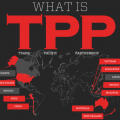Latest posts by Katitza Rodriguez
How the NSA Violates International Human Rights Standards
Under NSA surveillance programs, the US government has violated international human rights doctrine and even its own laws. Know the facts and learn how you can reclaim your digital privacy.
Peruvians To President: Our Digital Rights Are Non-Negotiable
Peruvian NGOs have launched a campaign asking President Ollanta Humala Tasso to set clear, non-negotiable limitationss to ensure that Peruvians' fundamental rights in the TPP are respected. The treaty could threaten Internet user's rights to free expression and access to information online, increase controversial aspects of Peruvian copyright law, and restrict the ability of Peru's Congress to engage in domestic law reform to meet the evolving IP needs and realities of Peruvian citizens and their growing technology sector.
TPP: Biggest Threat to Global Internet Since ACTA?
The United States and ten governments from around the Pacific region will soon meet to hash out the Trans-Pacific Partnership trade agreement (TPP). Negotiations of the agreement have been secretive from the beginning of the process, but based on leaked documents and the undemocratic nature of the entire process, advocates have every reason to be alarmed about the copyright enforcement provisions contained in this multinational trade deal.
Surveillance Camp III: On the Expanding Online Security Market in Latin America
Recently, we wrote about how companies throughout the world increasingly face political and legal pressures to assist governments in their surveillance efforts and the many ways in which the private sector is increasingly playing a role in state surveillance. In December 2012, EFF's Surveillance and Human Rights Camp in Brazil built upon this discussion and focused a spotlight on the privatization of public security, states funding surveillance initiatives, and the lack of quantifiable research on security markets in Latin America. Here is what we learned.
Surveillance Camp II: Privatized State Surveillance
This is the second in a series of posts mapping global surveillance challenges discussed at EFF’s Surveillance Camp in Rio de Janeiro, Brazil. Several Global Voices Advocacy Members actively participated in the meeting. This post is a summary of what we learned.
International Privacy Day: Anti-Surveillance Success Stories
January 28 marked International Privacy Day. Different countries celebrated this day calling attention to their own events and campaigns. This year, EFF is honoring the day by sharing some advocacy strategies utilized by human rights advocates and activists from Argentina, the UK, Canada, and the United States, that have helped to defeat overreaching surveillance proposals that threaten civil liberties.
Surveillance Camp I: Mapping Strategies to Counteract Online Spying in Latin America
This is the first in a series of posts mapping state surveillance challenges in Latin America and lessons learned at EFF's State Surveillance Camp in Rio de Janeiro, Brasil.
Privacy Rights Activism in Latin America
Throughout Latin America, new surveillance practices threaten to erode individuals' privacy, yet there is limited public awareness about the civil liberties implications of these rapid changes
Keep the Pressure On: Canadian Online Surveillance Bill on Pause, But the Fight Continues
Last Saturday, the Canadian government announced it would put proposed online surveillance legislation temporarily “on pause” following sustained public outrage generated by the bill. Since its introduction two weeks ago, Canadians have spoken out en masse against Bill C-30, the Canadian government’s latest attempt to update police online surveillance powers....
Mexico Adopts Alarming Surveillance Legislation
The Mexican legislature today adopted a surveillance legislation that will grant the police warrantless access to real time user location data. The bill was adopted almost unanimously with 315 votes in favor, 6 against, and 7 abstentions. It has been sent to the President for his approval. There is significant...
International Privacy Day: Fighting Data Retention Mandates Around the World
This January 28 marks International Privacy Day. Different countries around the world are celebrating this day with their own events. In EFF, we are calling on governments to repeal mandatory data retention schemes. Mandatory data retention harms individuals’ anonymity, which is crucial for whistle-blowers, investigators, journalists, and for political speech....
Internet Blackout Day Fires Up Digital Rights Activism Around the World
Yesterday was a defining moment for the global Internet community. The effects of the massive online blackout in protest of U.S. Internet blacklist legislation, SOPA and PIPA, were felt around the world as countless websites joined in a global action against over-broad and poorly drafted copyright laws.
Biometrics in Argentina: Mass Surveillance as a State Policy
Two years ago, the UK dismantled their national ID scheme and shredded their National Identity Registry in response to great public outcry over the privacy-invasive program. Unfortunately privacy protections have been less rosy elsewhere. In Argentina, the national ID fight was lost some time ago. A law enacted during the...
SOPA undermines the U.S. in its negotiations for a free, open Internet
Yesterday, the Organization for Economic Cooperation and Development (OECD) approved a Recommendation on Principles for Internet Policy Making [pdf]. It contains a set of 14 principles intended as a blueprint guiding Internet policy development for its 34 member states. Many of these principles uphold core values we have long championed:...
Northern Exposure: Unmasking Online Spying in Canada
The Canadian national anthem proudly honors “The True North strong and free!” Yet Canadians face an imminent round of frightening online spy proposals that threaten long held civil liberties and privacy rights. Public Safety Minister Vic Toews has insisted that he won’t budge in his support of online spying legislation despite heavy criticism from privacy watchdogs.
The Politics of Surveillance: The Erosion of Privacy in Latin America
While most Latin American countries have democratically-elected governments, many still fail to respect human rights, including the right to privacy. Across the region, there have been multiple scandals involving government officials and intelligence agencies engaged in illegal surveillance of communications. These include numerous chilling examples of how interception technologies are being misused to spy on politicians, dissidents, judges, human rights organizations and activists.
As International Privacy Day is Celebrated, Governments Continue to Chip Away at Privacy Rights
“Effective data protection is vital for our democracies and underpins other fundamental rights and freedoms.” – Viviane Reding, Vice-President of the European Commission and Commissioner for Justice, Fundamental Rights and Citizenship. Last Friday, privacy advocates and government officials in countries across the world celebrated the 5th annual International Privacy Day...

















